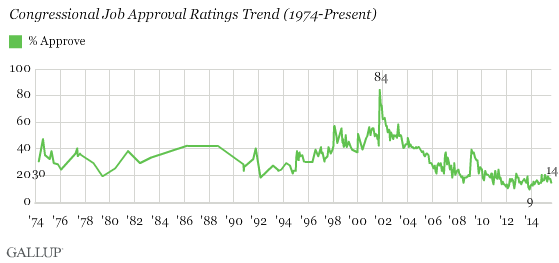When historians evaluate the presidency of Barack Obama, they will conclude that he and his administration did a remarkable job combatting climate change, given the limits of his legal authorities and the active opposition from the wholly owned subsidiary of the fossil energy sector, better known as Congress.
Unless there is a radical change in Congress's direction, the same historians will reach the verdict that America's highest lawmaking body was part of a conspiracy with polluters in crimes against humanity. The crimes in question were Congress's persistent work to block any effort to prevent global warming. Scholars will note the result: Enormous suffering among the world's people including those Congress was elected to serve.
In short, history's chroniclers will conclude that nation that held itself up as humanity's greatest hope turned out to be humanity's greatest disappointment. The United States Congress succumbed to greed -- the greed of politicians for power and the greed of energy barons to profit as much and as long as possible before the era of fossil fuels came to its inevitable end.
We Americans will be remembered as accessories to these crimes because we allowed them to continue unpunished, even though we had the power to stop them.
I raise these likely judgments of history to point out that the most important elections in 2016 will not be for the President of the United States but for members of Congress. The presidential election will get the most publicity as the media focus on strange comb-overs, State Department emails, Iowa corndogs and the like, but the races for seats in the House and Senate will be of most consequence to our future. Even the elections of governors and state legislators are likely to be more consequential than who wins the presidency because so many of the powers to curb climate change reside at the state level.
This is not to say that the presidential election is unimportant. Not at all. In that race, the central question on the central issue of our time is whether the next president will build upon or tear down the many things the Obama Administration has done. However, a Congress purged of climate action obstructionists could trump a backward president by turning Obama's perishable executive orders and international agreements into law.
If there is any doubt that the congressional elections are the most important on the 2016 ballots, then look at the results of last year's mid-term elections when Republicans won control of both houses of Congress. The new Senate Majority Leader, the principal lawmaker in the upper house, is encouraging states to break the law by ignoring the Administration's regulation of carbon emissions from power plants; congressional leaders are working actively to undermine a sitting president's foreign policy, including U.S. reliability in an international climate agreement; and the House is being controlled by a small minority of ultra-conservative climate deniers. Because the rest of Congress has not revolted against this tyranny of the minority, all members of both parties are culpable whether their contributions to the crimes have been active or passive.
As I have documented in past posts, Congress as a whole is unapologetically serving the interests of rich and well-organized fossil energy lobbies over the interests and preferences of the American people. The 2016 election is the next best opportunity for voters to clean house and to send a message to future congresses. It almost certainly is the last opportunity to elect a Congress that can do something about global warming -- if there's still time.
Polls have shown consistently that the clear majority of the American people with the exception of those on the very far right want an international climate treaty, regulation against power plant emissions, renewable energy, and federal leadership on all of the above. In contrast, only 9% of likely voters think that Congress is doing a good job in general right now, according to the latest poll by Rasmussen Reports. It's not that voters are habitually unhappy with Congress. The majority of Americans approved of its performance in 36 of 38 polls between 2000 and 2003, according to Gallup.
So, while the presidential primaries may be the most entertaining show in politics this year and next, the congressional elections will be the most important. Voters have an opportunity to give historians something uplifting to cheer about: A country whose people revolted against corruption and greed, fought for the principle of representative government, kept their democracy from becoming a plutocracy, and overthrew their Congress to prevent an egregious and premeditated crime on global scale.
An addendum: It is not likely that members of Congress would ever be formally charged with international crimes against humanity (among other things the United States is not a signatory to the International Court of Justice). I have written here about history's likely verdict. However, there is some question about whether members of Congress or their staffs can be prosecuted for violating the Logan Act, a possibility that also arose earlier this year when 47 members of Congress wrote to leaders in Iran to undermine the Administration's nuclear treaty negotiations with that country. News media report now that congressional staffers have been communicating with foreign embassies to undermine confidence in U.S. participation in an international climate agreement. Since congressional Republicans have twice shown their contempt for the Logan Act -- a potential precedent for more conflicts over the powers of the Executive and Legislative branches -- it's time for the Justice Department to step in.

